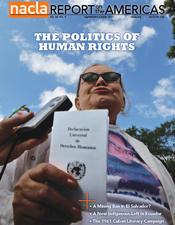Report
In Bolivia, the government of Evo Morales has promoted policies attempting to redistribute wealth and reclaim control over private media, transnational corporations, and mining companies. These policies are affecting powerful conservative interests, and the right wing is responding to defend what it sees as its human rights.
Cuba’s dissident women, the Damas de Blanco, have captured the world’s attention and successfully evoked popular images associated with South American women who organized against repressive regimes during the 1970s. However, as confirmed by recently released WikiLeaks documents, some powerful friends, including the U.S. government, are behind the Damas’ peaceful movement.
An odd role-reversal has taken place in Venezuela, whereby the center-right has adopted the human rights discourse and protest strategies of the left. International human rights organizations and the mainstream media have jumped on board, denouncing the Venezuelan government for countless abuses, ignoring the facts and the context, the past and the present.
During the Cold War, the U.S. promoted a discourse of security across the Western hemisphere over fears of the communist threat. We are now witnessing a strategic right-wing political platform whereby democracy is equated with free market capitalism, and “human rights violations” refer to new forms of state control over private interests.
In Honduras, state-sponsored repression is on the rise, even as the Porfirio Lobo government champions human rights as one of its “highest priorities.” Honduran human rights defender Bertha Oliva explains how human rights discourse in Latin America is being transformed from a tool to protect the victims into one for publicity and manipulation.
With the end of the Cold War, the United States began to justify its embargo against Cuba as a policy of human rights. Despite the discourse, the embargo itself violates basic principles of the human rights model established by the UN Universal Declaration of Human Rights.

